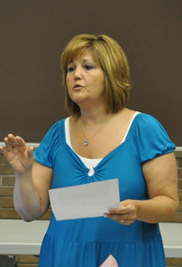Featured Article
The 30th Annual Black Squirrel Festival Continues a Kent State Tradition
The 30th Annual Black Squirrel Festival will take place Sept. 9 from 10 a.m. - 4 p.m. near Manchester Field and the Memorial Gardens, adjacent to the Kent Student Center.
read moreKent State at Salem “Boot Camp” Helps Prepare Students for College Courses
Posted Sept. 5, 2011
Academic Advisor Terry Hutson speaks
to students participating in Boot Camp, a
summer remediation program for recent
high school graduates and returning
students who have never attended college,
or have not recently attended.
It’s not what most people think of when they hear the words “Boot Camp.” Jeans and T-shirts replace camouflage. Physical exercises are replaced by mental ones. And the sergeant? A computer named ALEKs and an online program called Connect.
On June 28, Kent State University at Salem began a Summer Bridge Program sponsored by McGraw-Hill and the Ohio Board of Regents with interest from the Gates Foundation. The campus is only one of three campuses in Ohio to participate. The research-based initiative looks at the success of the emporium model, which is designed to replace traditional lectures with a learning resource center model giving students interactive software and on-demand personalized assistance.
Boot Camp is a summer remediation program for recent high school graduates and returning students who have never attended college, or have not recently attended. The program is also for students who have been unsuccessful in developmental math, reading and writing. The students are benchmarked against the university’s assessment test, which they take upon entering the program. They re-test at the end of the summer. The progress of those participating in the program will continue to be tracked through the 2011-2012 academic year. The results will shape the program for future implementation.
The program’s coordinator, Academic Advisor Terry Hutson, explained that students do not have to pay to participate. Faculty provides 10 hours of on-site lab time per week and students are to devote eight hours a week to the program. Both reading and math are offered.
For the math portion, students use a computer program called ALEKs PREP. Those students in the reading section use an online program known as Connect. This is coupled with a weekly one-hour compulsory lecture component. Hutson said the programs are set up similar to a video game. “Each time you master a level, you move to the next,” she says.
In addition to the computer-based programs, Math Facilitator Frank Palocyi and Reading Lecturer Kristina McLaughlin are available on-site to assist.
“The instructors are the motivating factor when the students need that extra push or reach a plateau,” says Hutson. “This is not just the student and the computer. The interaction of the course facilitator is a very important component that can make all of the difference. The course facilitator is available during classroom time, by email and also for one on one time if requested. The student is never really out there alone.”
